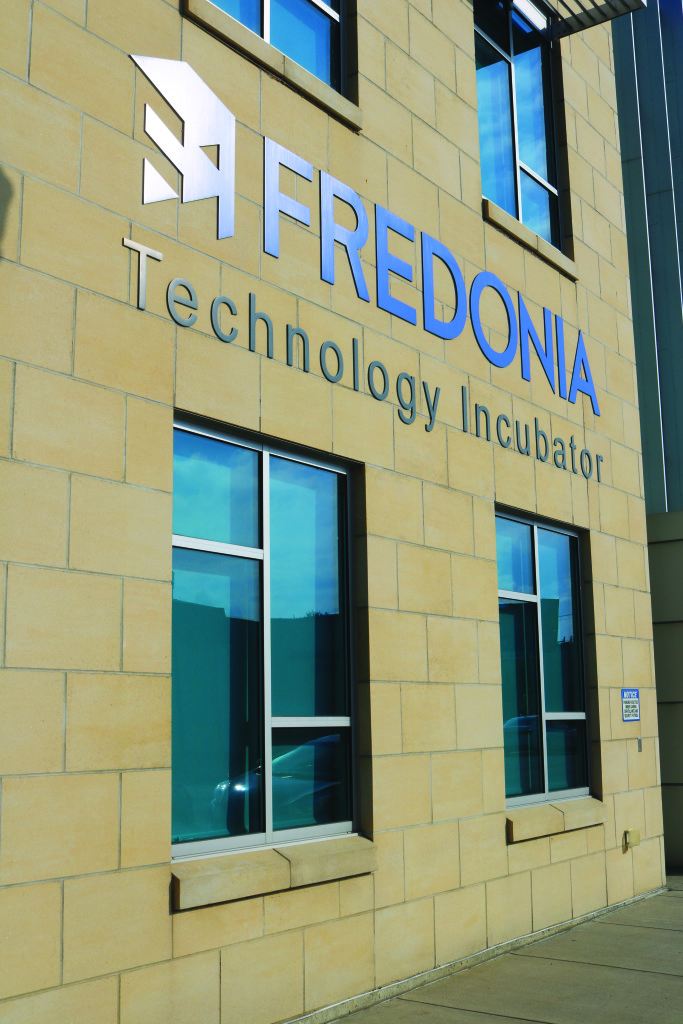CONNOR HOFFMAN
Staff Writer
On Oct. 21, the Fredonia Technology Incubator held its second open house, welcoming members of the community into the incubator to see what the technology incubator is and what it does.
“The purpose of the incubator is to facilitate the growth of startups and small businesses to create jobs in the area, and it also serves the purpose of trying to get opportunities for students to have applied learning and real world experience while they’re in the programs at Fredonia,” said Dr. Kevin Kearns, vice president of Engagement and Economic Development (EED).
“Ideally,” he continued, “long term, what we’re trying to do is have opportunities when our good students graduate so that they’ll have an option of staying in the area for jobs and perhaps even starting their own businesses.”
According to Fredonia’s website, the Technology Incubator is part of Fredonia’s division of EED, and is located in downtown Dunkirk. Kearns explained that they chose to build the Technology Incubator in Dunkirk rather than in Fredonia to help develop the economy of Dunkirk as well.
“Dunkirk as an area, as our sister city if you will, needs the most help. Demographically, they have a much higher poverty rate, their schools are struggling [and] they have a low socioeconomic population with high unemployment. So, frankly, that’s where the highest need is,” said Kearns. “I really think it’s important for us to get off campus, and for those who are a little more fortunate in this area to be down there helping out.”
The technology incubator has been in planning stages since 2007, and has helped 20 businesses and created 60 jobs, according to the school’s website.
The incubator has many new programs and opportunities this year that range from student-created businesses and internships to businesses owned by community members. The new businesses this year to the incubator include ArcAtlas Records, Light for Fitness, L2 Engineering D.P.C, Antefact Graphic Design and Lake Arts Foundation. The incubator also has offices for the Chautauqua Industrial Development Agency and the Chautauqua County Planning and Economic Development Department Northern Chautauqua County division.
ArcAtlas Records was founded by Michael Gonzales-Kelly, a senior music industry major, and Ariel Alex, a senior music sound recording technology major. ArcAtlas’ work includes helping artists deal with copywriting, graphic design and using the recording space and equipment they have. They also run a repair service for instruments.
“We want to provide a service to the plethora of musicians we have in the community. Since Fredonia is a music school, just naturally they dish out a lot of bands, so it’s kind of hard for all those bands to have availability for recording space like on campus in the studio. So we were, like let’s create one ourselves and have students come in that way,” said Gonzales-Kelly. “We offer starting musicians opportunities to help build their career like if they may not know how to do it or where to get started. We kind of guide them through that process as well.”
Light for Fitness is a start-up company focused on inventing and selling products related to light to give people a healthier life. The company was founded by Alan Haungs, a local community member.
He explained that the way we use artificial lighting currently causes diseases.
“A fancy title for that is called circadian disruption. It affects every cell of a person’s body and it is known to correlate to cancers of the breast, colon and prostate, insomnia, heart disease, obesity, diabetes and also mental disorders such as depression,” said Haungs.
Haungs explained exactly what circadian disruption is.
“You have a master clock in your brain, it’s 24 hours and 15 minutes long and it relies on the timing of light to resynchronize it to that 15 minutes every day.”
He explained that the brain releases melatonin throughout the day, and that artificial lighting — from things such as a television or cell phone screens — in the evening results in the brain releasing less melatonin. This disrupts the circadian rhythm.
Haungs has designed products such as sunglasses and computer screens to help fix the problem of seeing the artificial lights later on in the evening.
The incubator is only at about half-capacity right now, so it has plenty of room for more businesses to join.

